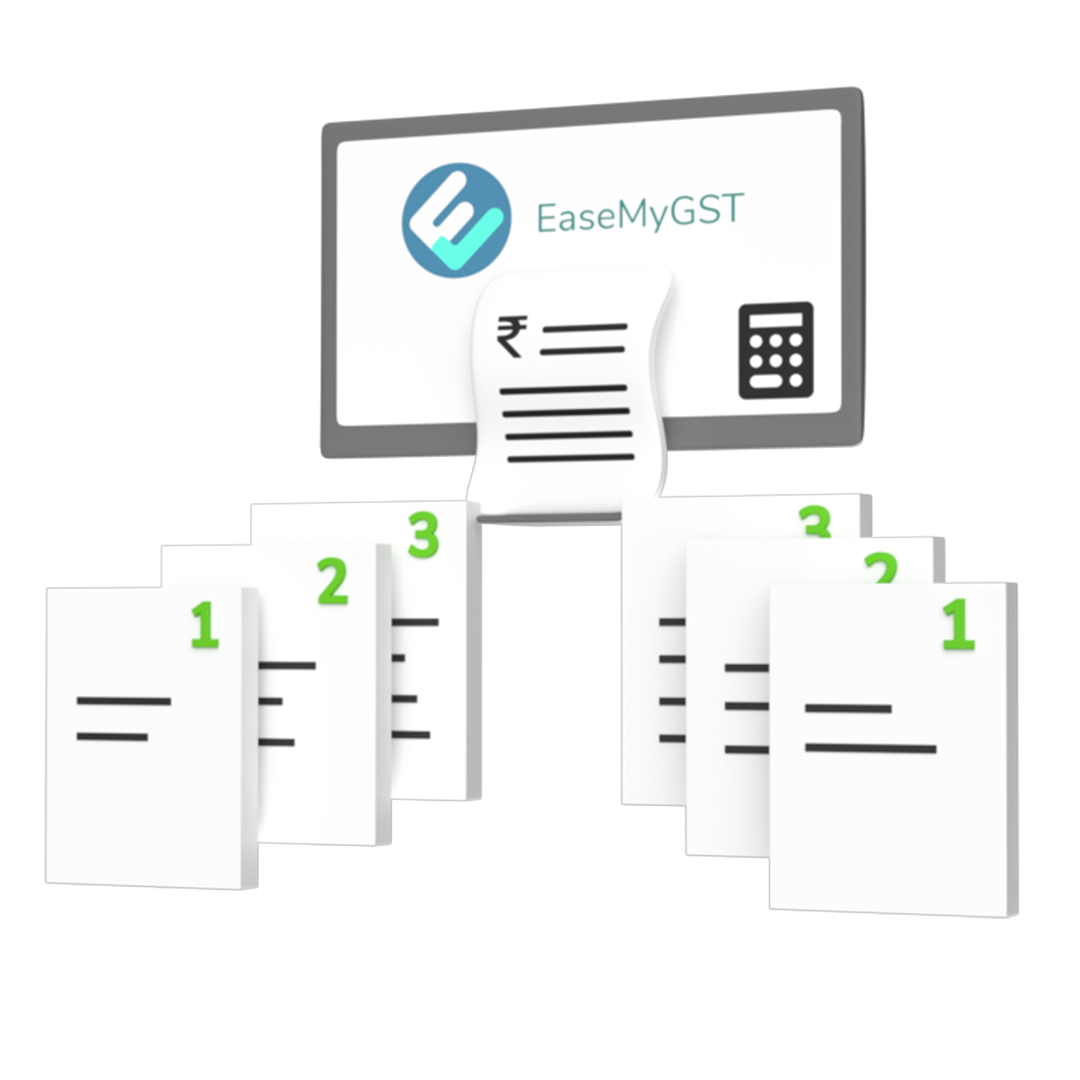How Retail ERP Enhances Multi-Location Accounting & GST Compliance
Imagine reconciling 500+ invoices across 30 cities in under 10 minutes. What sounds like a fantasy for most retailers is entirely possible with the right system in place. Retail finance today is notoriously complex. Revenue streams span in-store, online, and even marketplaces, while inventory moves between warehouses, distribution centers, and outlets.
For growing retailers, every new outlet, warehouse or franchise adds another set of accounting rules, tax rates and excel sheets to merge. Multi-location retailers can become lost in reconciliations and inter-branch transfers. These complexities can easily add up into cash flow issues, regulatory non-compliance, and blind spots that derail decision-making.
That’s where centralized Enterprise Resource Planning (ERP) makes all the difference, making financial clarity and reconcilitation possible across all touchpoints.
This blog breaks down how a robust retail ERP system can centralize data, automate GST filings, and deliver real-time visibility across multiple locations, enabling CFOs and controllers to put micromanagement behind and step into more strategic decision-making.
How Traditional Accounting Fails Multi-Location Retailers
Retailers with franchises face an array of accounting problems. Conventional tools simply weren’t built to handle this scale of financial operations.
Without an integrated system, multi-location retailers deal with:
- Fragmented data sources: Each store or warehouse may use different ERP modules or legacy POS systems. Finance teams must manually stitch together sales, cash and inventory data from disparate sources.
- Delayed reconciliations: When cash and card transactions pour in from dozens of outlets, matching them to bank statements becomes time consuming. Data mismatches crop up and month-end closes drag on.
- Manual errors in journal entries & inter-branch transfers: Manual journals for inventory transfers, stock movements or branch expenses invite mistakes. Without automatic inter-branch posting, finance teams must hand-audit transfers, which can introduce errors.
- Tax jurisdiction variances: Different states mean different GST rates and rules. Stock moved interstate uses IGST vs SGST/CGST for intrastate. Calculating these and updating ledgers across states is complex. Tracking Input Tax Credit (ITC) across these GSTINs adds yet another layer of difficulty.
- Stock valuation and internal transfers: Deciding how to value stock moved between stores, whether it’s average cost or FIFO, can complicate the ledger. Manual inventory transfers often lack consistent policies, creating phantom stock or skewed cost-of-goods figures.
- Poor visibility into real-time financial health: With scattered data, executives struggle to see timely P&L by outlet or region. Lack of centralized reporting leads to unclear financial insights across the business, keeping decision-makers in the dark until after month-end closes.

Gain real-time financial visibility for every store with centralized accounting powered by Ginesys.
GST Compliance Challenges That Can Cripple Retail Finance
India’s GST regime adds to the existing complexity for multi-location retailers. Under GST, any entity operating in multiple states must obtain separate GST registrations for each state. Each registration mandates its own GSTR-1/GSTR-3B returns, e-way bill reports and invoice records. Transactions must be reported invoice-by-invoice, ITC claims meticulously matched, and now many large retailers must even generate e-invoices with unique Invoice Reference Numbers for B2B sales.
At this stage, several key challenges arise:
- Tracking ITC across locations: When a head office buys goods taxed at one rate and ships them to a branch under another GSTIN, matching the input credit to the correct state’s output tax is tricky. Manual tracking of ITC in multi-entity contexts often misses credits or generates errors.
- Intra-state vs inter-state taxation: Movements within the same state incur SGST+CGST, while interstate stock transfers use IGST. Each move requires different tax accounting. Without automation, determining correct tax postings per transfer is a recipe for calculation mistakes.
- Managing multiple GSTINs: Each store or warehouse with its own GSTIN means separate ledgers. Finance teams end up maintaining distinct records and returns for each branch. Consolidating these filings manually is almost impossible at scale.
Without ERP-driven tools, what retailers with dozens of outlets essentially deal with is a compliance tightrope. Every misclassified invoice or missed entry can trigger fines.
Retail ERP: The Financial Infrastructure Your Brand Needs
Unlike generic ERP systems designed for manufacturing or services, a true retail ERP is purpose-built for store chains and omnichannel brands. It is designed to handle multi-store inventory, POS data, pricing/promotions and customer loyalty alongside finance.
A retail ERP centralizes data from all sales channels and stores into one platform. Whether a sale occurs online or in a physical outlet, the financial impact flows into one integrated ledger in real time.
A modern retail ERP include features like:
- Centralized accounting and real time synchronization: All store-level transactions automatically post to the corporate books. There’s no more batch uploads or isolated ledgers. Real-time synchronization means headquarters instantly sees daily revenue and expenses per outlet.
- Branch-wise P&L and automatic consolidation: Each outlet or franchise unit can generate its own profit & loss statement within the system. The ERP then rolls these up into a consolidated company P&L with one click. Geographically dispersed balances and inter-branch transfers are auto-adjusted in the background. Month-end closes shrink from days to hours, because the system has already reconciled most entries.
- Automated GST return filing and validation: Sales and purchase data flows into GST returns automatically. The ERP platform formats GSTR-1 and GSTR-3B filings from live data and even pre-validates entries against compliance rules. What used to be manual form-filling is now a push-button upload to the GST portal. This also extends to e-Invoice and e-Way Bill integration: the system can generate IRNs and e-way bills on the fly as goods move, ensuring every big transaction is compliant.
- E-invoice and e-way bill integration: For B2B sales requiring IRNs, ERP users can trigger e-invoice generation directly from the billing screen. The ERP handles cancellations or amendments as needed. Similarly, e-way bills for transport can be produced automatically from delivery orders, saving hours of paperwork. This tight integration means GST compliance becomes zero-touch.
- Vendor compliance tracking: A retail ERP links purchase invoices to orders and receipts. It flags mismatches before they hit the books. Payment terms and licenses like GST registration validity can be monitored in the system, so vendors stay compliant. Faster matching and approvals of invoices ensures vendors are paid correctly and on time.

Ensure compliant stock transfers with Ginesys ERP’s real-time valuation and tax automation.
How Retail ERP Translates into Real Financial Gains
Retailers using ERP systems often see measurable financial benefits that directly impact the bottom line.
- Faster month-end closures → quicker decisions: By consolidating data across locations, ERP dramatically shortens the month-end close. With faster closings, finance teams can deliver updated P&Ls sooner, helping leadership respond quickly to trends and performance.
- Live financial dashboards for every store: With all store data feeding into a centralized system, decision-makers gain a real-time overview of operations. Custom dashboards display sales, expenses, and KPIs by location or region, making performance comparisons easy.
- Zero-touch GST compliance: ERP takes the guesswork out of GST filings. Transaction data flows directly into pre-formatted return templates, eliminating repetitive entry. This level of automation drastically reduces errors and virtually eliminates late fees or penalties.
- Faster vendor settlements, fewer disputes: ERP accelerates procure-to-pay by automating purchase orders, invoice matching, and approvals. Matching GRNs with invoices reduces discrepancies, helping finance teams pay vendors on time and maintain healthy supplier relationships.
- Audit-ready at any moment: With detailed audit trails, every financial transaction is time-stamped and traceable. ERPs like Ginesys allow auditors to retrieve accurate records instantly.

Smart Growth Starts with Scalable Finance Systems
Legacy systems struggle with rising transaction volumes, leading to data inconsistencies and reporting delays. For growing retailers, a robust retail ERP ensures growth doesn’t bring chaos by embedding scalability into daily operations.
- Quick setup for new locations: New outlets are easily added as nodes in the ERP network. With just a few configurations like location codes and GSTINs, stores are ready to transact from day one. Sales and expenses flow directly into a centralized general ledger, removing the need for separate books per location.
- Standardized tax and accounting policies: The ERP enforces consistent tax rates, chart of accounts, and accounting rules across all branches. This removes discrepancies caused by regional variations, ensuring every branch reports using the same financial structure and metrics.
- Centralized inventory and payment workflows: With a single ERP system, inventory is tracked and managed uniformly. Alerts, replenishment, vendor terms, and payment rules apply across the network. Finance no longer needs to manage exceptions store by store.
- Finance and operations grow together: An integrated ERP scales with business expansion, whether that involves a new franchise, product line, or sales channel. Existing financial workflows and controls adapt to new additions, preserving consistency and control as you scale.

Simplify GST compliance across all locations with Ginesys ERP’s automated return filing and e-invoicing tools.
Bring Order to Multi-Outlet Retail Finance with Ginesys
Ginesys is a cloud-first, retail-native ERP built to tame the complexities of multi-location operations in India. By integrating POS, inventory, procurement, finance, and GST workflows, it provides a unified platform trusted by over 1,200 brands, from apparel chains like Soch and VMart to multi-brand supermarkets.
Here's how Ginesys delivers order and efficiency to your retail finance:
- Retail‑Centric Finance Engine: Automates journal entries, reconciles inter‑branch stock transfers, handles returns, and posts ledger updates in real time, eliminating manual reconciliation and ensuring branch-level accuracy with each transaction.
- EaseMyGST for GST Compliance: Offers seamless GSTN integration to auto-generate e‑invoices and e‑way bills, support bulk GSTR‑1/3B filings, and push data with one click—significantly reducing errors and compliance delays.
- Automated GST Reconciliation: Uses smart algorithms to match invoices even across financial years or numbers, delivering full reconciliation and reliable Input Tax Credit (ITC) records.
- Franchise Financial Control: Enforces consistent tax rules, pricelists, and markup structures across all outlets and franchised stores, simplifying consolidation and ensuring uniform financial performance.
- Live Dashboards & Audit Trails: Provides real‑time visibility on sales, stock, and expenses per location, with traceable logs for every financial action, making audits seamless and transparent.
- Scalable Cloud Architecture: Supports rapid expansion, new stores only need location and GSTIN setup to activate full financial workflows under the same centralized system.

Accelerate your month-end close from days to hours using Ginesys’s intelligent retail accounting engine.
Managing multi-location accounting and GST compliance doesn’t have to feel like a constant uphill battle. Retailers that invest in a purpose-built retail ERP gain real time financial order, insight, and automation.
Ginesys empowers finance teams to ditch the spreadsheets and audits-after-the-fact, and instead run every store on real-time data, automated tax workflows, and unified financial policies. From daily reconciliations to monthly filings, everything just flows and scales with ease.
Book a demo to see how Ginesys simplifies multi-location accounting and automates GST compliance for smoother financial operations.

